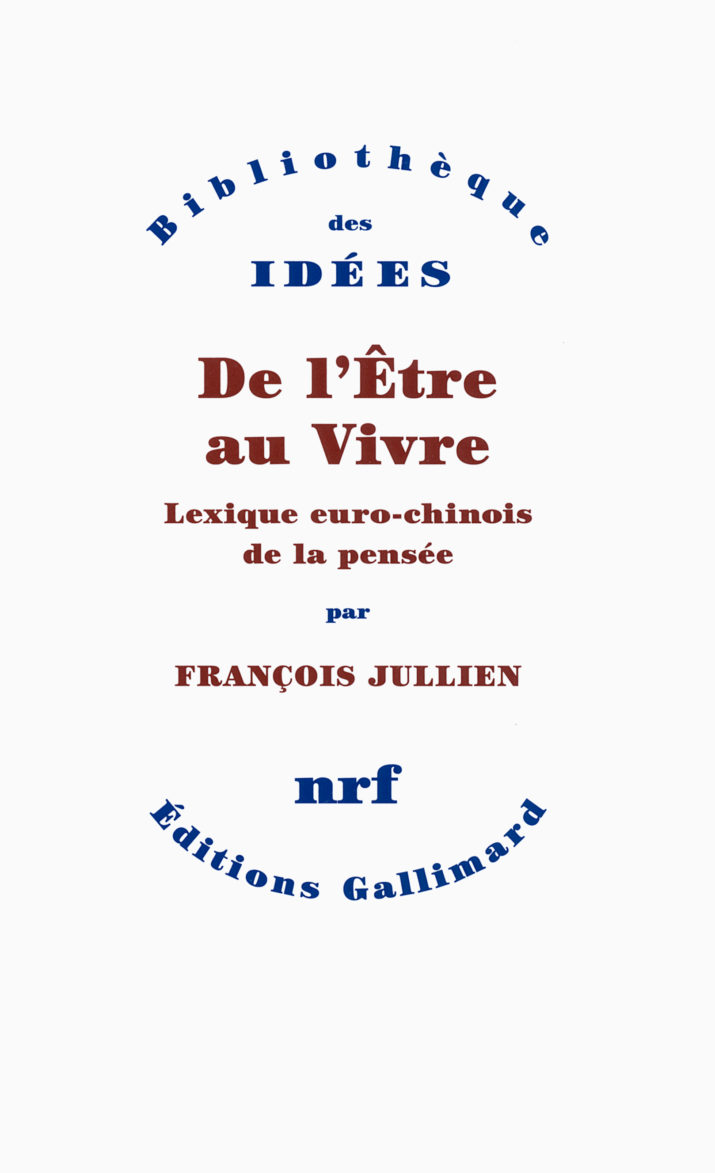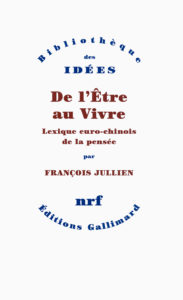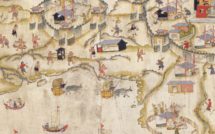
 François Jullien is a world-renowned French philosopher and sinologist, a most widely translated thinker with a prolific oeuvre on Chinese thought and culture. Having uniquely forged an intellectual reputation as an intercultural philosopher, he aptly holds the Alterity Chair at “Fondation Maison des Sciences de l’Homme” in Paris.
François Jullien is a world-renowned French philosopher and sinologist, a most widely translated thinker with a prolific oeuvre on Chinese thought and culture. Having uniquely forged an intellectual reputation as an intercultural philosopher, he aptly holds the Alterity Chair at “Fondation Maison des Sciences de l’Homme” in Paris.
“De l’Être au Vivre. Lexique euro-chinois de la pensée” [From Being to Living. Euro-Chinese Thought Lexicon] was published in 2015 and is presently being translated into English. To those unfamiliar with Jullien’s conceptual apparatus, the book is an auspicious comprehensive foray into the philosophical “propensions” he nurtured throughout his life-long parallel exploration of the Chinese and European minds. To his more honed readers, Jullien avows the need to perform a thorough perusal of his creative tools.
Jullien’s Lexicon comes out at a time when what he sees as the coronation of the bi-centennial “Western theoretical globalization” coincides with a vertiginous teeming of fissures and civilizational malaise across the West. Onto an intellectual world stage saturated by Europe’s subject centrality and imperium of “Being,” in flows ever more resonantly the heterotopic, egoless continuum of Chinese thought.
The Euro-Chinese Lexicon is not an exercise in comparison. For Jullien, scouring for similarities and differences between cultures is bound to end up in creating Janus-faced “theoretical monsters,” indistinctly subsuming cultural commonality to tautological pronouncements (“the human is the human” everywhere) on the one hand, or thickening cultural diversity into abstract rival entities (“China” and “the West”), on the other.
His endeavor is rather aspiring to reach the “in-betweenness” (l’entre-deux) of the two “language-thoughts.” By zigzagging between them, without perduring on either side or the other, he strives to create – indirectly and ever so slowly – the necessary conditions for their coming together (rencontrer). At stake is dispelling both the temptation to project the categories and “partis pris” of one own’s language-culture onto the Chinese “outside” and the illusion of an immediate translation between them.
To do so, Jullien is compelled to create new philosophical tools; as such he populates his Lexicon with conceptual distances (ecarts), able to break through the generality of concepts, to open their sought after in-betweenness. The act of distancing unfolds the seeming equivalence of the Euro-Chinese concepts comprised in the Lexicon, and elucidates their mutually reinforcing antinomy. To the philosophical eye, there is no doubt that through this technique Jullien intends to raise important questions about concept development in Western philosophy. Even so – especially in the context of a sinological-historical reception of his work being advanced to the detriment of a philosophical one – he feels the need to stress that his is not a historical appraisal of the two thought traditions, nor is it a purely theoretical one. In-between language-thoughts and approaches, “vagabond concepts” criss-cross the fields of history, morality, aesthetics and politics and “strategize” to create new possibilities for a philosophy of “living.”
For Jullien, the amplest and most consequential fissure between the Chinese and European thoughts emerges with the realization that the Chinese haven’t developed the concept and grammatical function of “subject.” As its understanding of the world was not founded on a logic of causality, Chinese thought didn’t need to interrogate the existence of a “starting point” and hence – as Jullien notes – has never had to abstract “pure thinking” by ascribing it to a moment zero. As such the invention of something like the Cartesian “cogito” and the detaching of the subject were not necessary. Therefore, there is no “I am” in Chinese to replicate how European philosophy has centered the “absolute” of existence on the thinking self. In the absence of a pronominal system and verb conjugation, there was furthermore no need in Chinese for an explicit syntactic subject.
Or, it is exactly because of the Chinese indifference to a largely illegible cogito – seems to exclaim Jullien – that the unquestioned legitimacy and dominant heredity of this concept can be interrogated from outside the European language-thought, its singularity and historicity exposed. This outside perspective seems to almost topologically meet an inside one, when Jullien refers to Nietzsche’s brilliant insurgency against metaphysics. Is invoked the latter’s attack against what he saw as being inscribed in the very characteristics of the European predicative grammar: the slipping behind the contingent phenomenal of a substantialized entity, seen as subjacent and promoted as a stable, definitive subject – “as magnificent, but also as overdone and superfluous, as it is naïve.” In this distance opened between Europe and China on the question of the subject, Nietzsche’s call for “an unassigned operativity, unenacted actualization, a situational undoing of the subject” seems almost moulded to the Chinese language-thought, and uniquely able to explain furthermore its difficult translation into European languages.
Pushed in the “unthought” (l’impensé) of the subject’s dominance – Jullien suggests – is something which in the European language-thought can only be approached and understood with approximation, for not having had the chance to develop, but which is central to the Chinese thought: the concept of “situation.”
Jullien draws this concept primarily from the Book of Changes (Yi Jing), an ancient divination text and the oldest of Chinese classics. From it the situation emerges as an internal tensioning, a polarity between different factors which thus become correlated. All the fields and registers of the Chinese world are imagined in terms of “complementary opposites” “inter-inciting” (xiang gan) one another: “the yin and yang energies in nature, the masculine and the feminine, the governed and the governor, the parent and the child” etc. Further nurturing this, Chinese grammar – with its use of parataxis (i.e. coordinate rather than subordinate clauses) – allows keeping the One and the Other coupled. It is not out of any one of these terms’ separate actions, but of the relationship and exchange taking place between them that reality (“the process of things”) ensues. Jullien opposes the Chinese situation to what is colloquially called in Europe “circumstance” – something that “encircles” the point of view of the subject who, by its very nature, isolates and composes the reality around it instead of correlating “with” it.
Undergirding this “force of correlation” of the situation is the principle of “coherence,” which “holds things together” by virtue solely of the internal relation itself, without there being a need for a support in the form of Being and Substance. If in its constant search for meaning, European thought is looking for the essence of things, the principle of coherence is used to understand and ensure the “consistence” of the world. Jullien points out how “coherence and consistence, ever so slightly and singularly appearing in the smallest phenomenal manifestations are connected at a larger scale to the coherence of the course of things, which holds the whole world together.”
Moreover, as the Chinese language-thought is a strategic one by excellence – as Jullien is keen to emphasize several times – establishing the coherence of a situation is fundamental to one’s ethical and strategic behavior in relation to it. This is the case because coherence is also a principle of intelligibility of the world, which Jullien sees as rivalling the European knowledge and signification system: “Relationality in itself possesses sufficient effectiveness to ensure the intelligibility of the existent.” It is telling, according to Jullien, how the Chinese term for “reason” (li), far from having anything to do with an Aristotelian argumentative art of the logos, is rendered graphically as the natural grain of the jade which the stonecutter follows with his chisel to cut the stone. Likewise, the reasonable Chinese follows the internal coherence – the fissures and lines of separation (“lines of force and of life”) – of every situation, reveals its consistence, “cooperates” with the process of things, rather than projecting and building onto it, and strategically adapts his behavior to its evolution.
For it is the evolution, the constant renewing of a situation that the Chinese thinker is most attuned to. Jullien draws on the ancient concept of “shi” tImperfectly translated as either “situation” or “evolution” – further testament to the European conceptual withholding from seeing things simultaneously in their configuration and transformation – shi is rendered as “propension” by Jullien and used to wage blows to the architecture of causality on which European metaphysics and science dormantly rest.
For the Chinese spirit, which doesn’t understand the world in terms of origins, things come to be not because of any one cause, but because they are tipped forward through propension into reconfiguring themselves (in one way or another). This is because – as elucidates Jullien – for the Chinese, it can’t be said that things are, as such, but that, in the tensional field of correlated vectors, variations and polarities in which they “are implicated,” they “inflect.”
Moved thus by inflexions, the Chinese world – be it in politics, arts, on the battle field, or in its general understanding of history – is one to be “discerned” through “contextual” intelligence. This needs to be at the same time “ramifying and globalizing,” attentive to how in every moment the situation is brought to “incline” in a certain way, ready “to detect in every thread or fibre of the situation an initiation of transformation,” in order to perceive the future mutation in the present. In relation to a history that hasn’t developed in general through heroic events and acts of will, but which has been tenaciously unfolding “obliquely” through “silent transformations,” the Chinese mind is ever so careful to assign qualifications, believing as it does that any “manifestation is in itself resultative, and as such, outdated.” “The effective is in propension” – proclaims Jullien – whereas that which accepts recognition and identification, labelling or buoying has already discreetly started to be inverted.
Albeit China not wanting to qualify its own current political and economic situation, meandering its way between liberalization and repression, the question arises as to it being able to maintain a low profile in its new hegemonic capacity on the world stage. Jullien seems to believe that there is scope for the Chinese art of adaptative transformation to be promoted globally. His words on the fundamental role played by the concept of “influence” in the Chinese intelligibility of the world summarize well what the Chinese alternative to the globalized European language-thought could be: “[It is] because Chinese thought is not informed by ‘Being’ and Identity, but by fluxes of energy, poles and ‘inter-incitation’; because it operates in terms of ‘change’ and ‘continuation’, of ‘communication passage’ and of ‘transition’; because in its grammar, it knows not the morphological distinction between the active and the passive voice; because in its physics, the notions of ‘distance echo’ and ‘mutual resonance’ are substitutes of causality; because it recognizes the individual as a person, without preoccupying itself with erecting an autonomous subject – China has placed influence at the heart of its intelligence.”
Alternative to the Western universalizing consciousness – yes – but that is not to say that Jullien is thinking along the lines of any civilizational clash paradigm à la Huntington. In his books and public appearances, he spoke vehemently against understanding cultural phenomena in terms of essence-defining differences. In the Lexicon he pleads once again for refraining from the “contaminating language of Being,” on which rests – complacently, lazily – the concept of identity (“the Idem of Entity”), with its impulsion to think in terms of stability (the unchanging culture) and homogeneity (the pure culture). Not only is it intellectually abortive to speak of any such thing as an “identity of a culture”, for there being so many exceptions to such generalizations. But it is also precisely these exceptions that – through their singularity – open “inventive distances” from one’s own culture, wherein “cultural fecundities,” “resources” – born out of a particular milieu, but without being “owned” by it – become “effective” and “available” to be deployed and activated elsewhere; “not so much exportable as unattached.”
In the active distance between cultures, Jullien catches a glimpse of what – according to him – is their only effective common ground: “the intelligible” (the possibilities of thought). Over and above cultural commonality and dialogue, the fundamental issue for Jullien is revealed to be that of the “common of the human.” Putting forward that “the common of the human is the intelligible” is not intended to mean that this commonality is a definite given, nor that it is a hypothetical reality, nor that it can be substantialized (as in the form of an identity-laden “human nature”), but that, in itself, it needs to be produced and deployed. Through this production and deployment within the many distances opened by cultural diversity, the human – any human – discovers and understands/thinks itself (l’auto-réfléchissment de l’humain), “in the multiplicity of its adventure at the same time as that which forms its common destiny.”
While recognizing the competitive relationship between different possibilities of thought, their ever-changing coherences, the production of commonality should first and foremost retain their “non-exclusive, non-necessary” character. Jullien thinks this is the only way in which their “coexistence” can be ensured, without falling on either side of the “ideological blockage,” i.e. by seeing them as either contradictory (from the perspective of one or the other culture) or by embedding them within a unique history (“the necessary development of the human spirit” etc). If Alain Badiou commended Jullien for a philosophical project built around the hypothesis that: “it is true that there is only one world, but this world is structured by different thoughts,”[1] one could easily advance that the coexistence through distance of these different thoughts is also a central and urgent question of his philosophy.
Finally, by moving between European concepts and Chinese coherences, by reprofiling, rediscovering the former through the activation of the possibilities of the latter, Jullien’s Lexicon is devised to – indirectly, side-ways and without thinking about it – usher in his philosophy of living. If the common is in the distance between the two respective language-thoughts and can only be accessed by placing them vis-à-vis one another, living can also be seized in this very act of opening and questioning of categories. Obscured and partialized by its two-dimensional conceptualization in Europe – the existential/metaphysical (Life) and the biological (health) – living will take shape, according to Jullien, “when it stops to tip over into the former and not be limited to the latter.” Accessing the in-betweenness of the ways in which we live and think is for Jullien as ethical and strategic a choice as it is to access the common between cultures. His Euro-Chinese Lexicon is meant as a guide for anybody who wants to start living.
Reviewed by Anca Pop
De l’Être au Vivre. Lexique euro-chinois de la pensée
By François Jullien
Publisher: Gallimard
Hardcover / 313 pages / 2015
ISBN: 2070148661
[1] Chartier, Pierre et al. (2007), “Oser construire, pour François Jullien. Penser avec la Chine”, Paris: Seuil, 150




